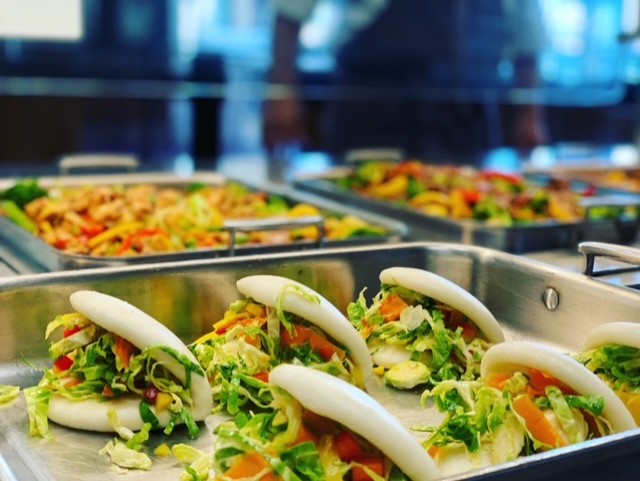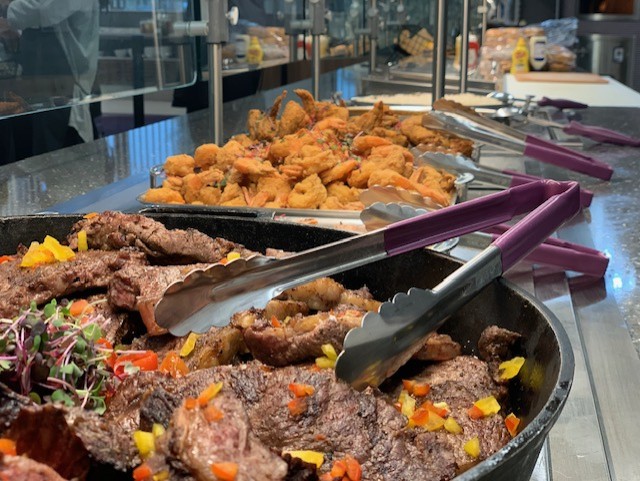Right as 11 a.m. rolls around, LSU student-athletes across all sports flock to the Football Operations Center for a midday meal. They abandon their electric scooters and eagerly prep their plates with fresh salads, lemon garlic chicken, grilled redfish, build-your-own wraps and more.
Michael Johnson makes his rounds at the dining hall that’s reserved for student-athletes, making sure that serving stations are plentiful. Johnson, executive chef of the university’s Performance Nutrition Center, works with a team of chefs and dietitians to create menus that give all LSU athletes the right kind of fuel.
Johnson, also known as The Tiger Chef or just Chef to the students, says he tries to create meals that are mindful of the athlete’s health. He also works on being as sustainable as possible in the kitchen and aims to find locally sourced ingredients.
|
|
|
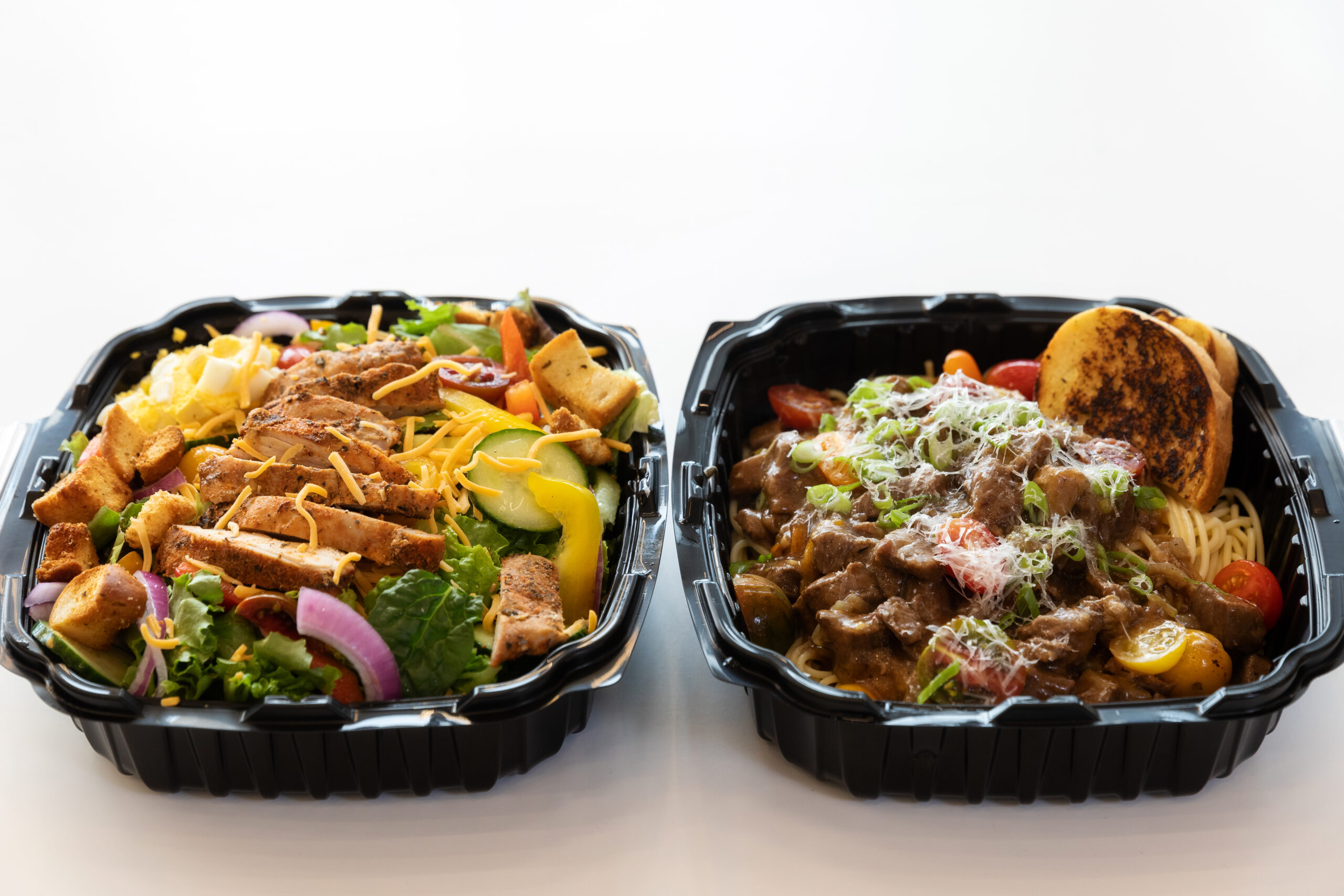
Johnson made the team as executive chef when LSU renovated its Football Operations Center and added the Performance Nutrition Center in 2019. What have the past few years been like feeding championship-winning athletes? We caught up with Johnson to find out.
Quotes have been edited for clarity and brevity.
Tell me a little bit about your culinary journey and how that brought you to this current role with LSU.
“I always tell people that jobs find me. … Prior to here, I was with the Seattle Seahawks for three years and the Seattle Mariners for three years. Prior to that, I was in Kansas City as a hub chef where I worked for a minor league baseball team in the summers, and that rolled into working for the Kansas City Chiefs in the winters. So my office shifted every six months, but I also oversaw five other properties in Kansas City. … Prior to that, I taught culinary school (at Louisiana Culinary Institute), which was really fruitful. I have several chefs who work for me now that were students of mine. I worked in a hotel restaurant. I worked in casinos. I worked in fine dining catering. I purposely rounded myself off to have an understanding of all of those genres of cooking. Ultimately, it was farm-to-table food that caught my eye and morphed into a passion for what we put into our bodies. It just kind of falls naturally into what I’m doing now.”
Are you originally from Louisiana?
“I’m Missouri-born, but I claim Baton Rouge and Louisiana as my home. I have two kids that were born here. I have family that lives here. So, for me to be here, it is like being home.”
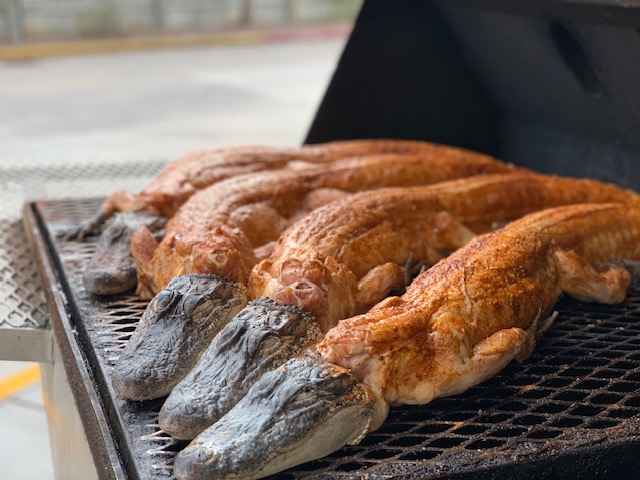
Besides football, what other teams do you feed?
“All athletes. It’s one of the touches of pride we have in this place. There are a lot of people out there doing performance nutrition, but not a whole lot of them are involved in all sports. …There has to be respect for all athletes, and I think that we manage that quite well here. We cheer for all the sports.”
Tell me about the flow of the dining hall. How many students do you serve?
“250 kids for breakfast, 300-something probably for lunch and then pressing 500 for dinner. We will put 1,000-plus meals out in a day. And, no two meals are the same. We do have steak nights on Wednesdays. That’s a standard. You’re going to see a steak every Wednesday. We haven’t had anybody complain about that yet. Even if we had a Taco Tuesday, it’s not going to be every Tuesday. There should be variety in the diet. And we’re trying to avoid food jags. We’re trying to invite and teach. This is for student-athletes, and the root of that is trying to teach young minds how to eat better. Or, eat for their body type even more specifically.”
Is there a certain dish that you prepare that seems to be a favorite among the athletes?
“Monday nights are fried foods. We moderate how much deep-fried food we do just because of its nature. So deep-fried foods on Monday always go over well. It’s kind of funny, because the nutrition center is almost exactly the opposite of a restaurant. For a restaurant, Friday, Saturday or Sunday are the busiest nights. We’re closed on Saturday and Sunday. On Friday night, it’s crickets in here. We might feed 100 or 200 kids compared to 500. Then on Monday, whenever the weekend’s over, the game’s over and everybody’s going back to class, it’s absolutely bonkers in here.”
How do you decide what to prepare for the athletes?
“Inspiration comes from anywhere. We take comfortable foods that we know the kids like to eat, and then make them into something that’s healthy, if it’s not already. The first conversation that happens is, ‘what do that student-athletes want?’ …We try to do an eight-week cycle menu and then bring it back around so that it doesn’t go too far without having repetitiveness, but it’s not too repetitive. I will go out and engage with the athletes on their turf or their facilities. It’s my version of me going to them and meeting them on their terms, because some kids don’t want to talk about food with the chef over their shoulders while they eat. I feel like I get more honest feedback and engagement when I go see them. … We try to have multiple avenues of communication for the athletes, like text messages, emails, QR codes. We have all kinds of stuff that they can give us feedback on so that we’re keeping it fresh and giving them what they want. We follow the food trends. We follow what they’re eating outside of here.”
Let’s talk football. Are there any special meals that are prepped for the team during the season?
“We do open for football only on a Sunday when they come back (from a home or away game). It’s an important recovery day. We call that a victory meal. But it’s just a playful term for that meal. … Typically, because they have played on a Saturday, they’ll fly back on Saturday night, and we’ll want them in here eating a recovery meal as soon as possible. So we’ll serve them a brunch-y style meal on Sunday morning, and then everybody goes home and gets a little rest. Then we go back to serving everybody on Monday.”
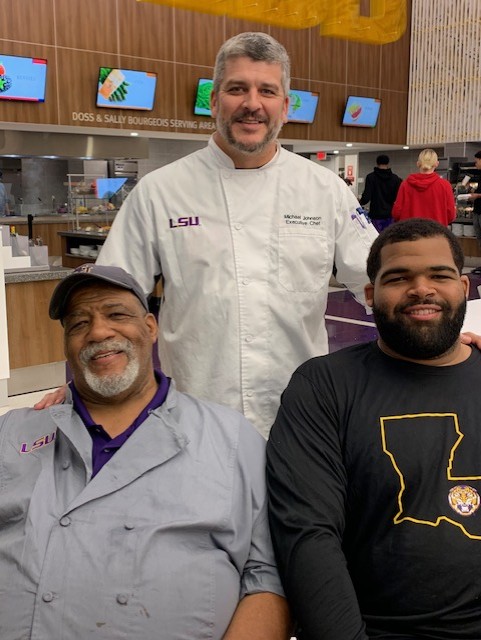
Do you go to away games? If so, how do you prepare for that?
“I used to travel with the team. Now my executive sous chef travels with the team. … We send a chef on the road early to interact with the away team catering department, not to tell them what to do, but to engage with them and kind of give them pointers on how our guys eat, how they like things cooked. … It’s an intense environment (on the road). LSU football is ready to play. There are times when all you can hear is plates and silverware clacking on the table.”
|
|
|
This summer, the chefs for LSU Athletics went viral when eagle-eyed fans spotted y’all on the team’s website. What did you think of this recognition?
“The interesting thing is that LSU listed us on their roster from day one. It was that important for them that they were putting that much time and energy and buying into performance nutrition. And so, it was kind of a ‘What’s going on here?’ moment. Of course, we were super happy that everybody got the recognition. Super happy that LSU was getting the recognition for the energy that they put into that. And, there are so many opinions on the internet, right? Some of the negative opinions were that LSU was just following the trends. And the funny thing is, we’ve actually been here for five years. We have a seat at the table. We have conversations with the dietitians and administration. We’re not treated less. We’re treated as equals. You go to a lot of schools, and the chefs are treated as help, and you’re never going to get the best out of the facility or the people if you’re treating them as less than. That’s what I love about LSU.”
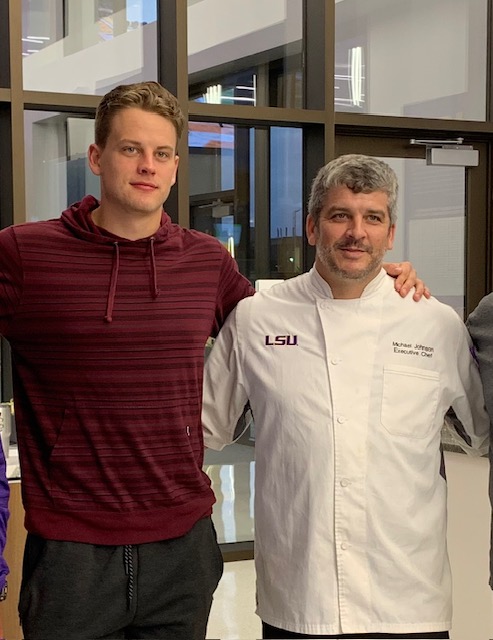
Tell me about the rest of your team.
“Growing human beings is something that’s important to me. I don’t want to stifle human beings to stay here and work underneath me. It’s camaraderie. Performance nutrition just has a specific calling. I think most people have an interest in nutrition. But performance nutrition is a little bit more than that. It’s not just what you’re putting in your body. It’s when. It’s how. It’s recovery and fuel. It’s a little bit more engaging than just eating right. It’s not just chef work. It’s a very, very specific niche.”
Besides prepping meals, what else does your role entail?
“I’m always engaging with the local environment and trying to find the right materials. … We don’t really have a whole lot of organics down here in the southeast. It’s something that I would love to see, but it just hasn’t picked up. Being sustainable is important to me, and that’s not necessarily something that translates outside of these doors. Maybe on campus, but not necessarily in Louisiana. That’s something that becomes challenging. … It’s a lifestyle. I have children, and it’s important for me to leave this earth that we live on intact for our children and their children. It is definitely something that I push on a day-to-day basis. And, partnering with people who see things the same way.”






